Palak Gupta, Mittal Institute Graduate Student Associate, is an architect from India, and a graduate student at the Harvard Graduate School of Design. Since her undergraduate studies at Academy of Architecture, Mumbai University, she has been involved in pedagogical and research conversations involving the communities vulnerable to the impacts of climate change and urbanization. We spoke with Palak to learn more about her research.
Mittal Institute: Thank you for speaking with us, Palak! You have been an architect for four years – what drew you to the Harvard Graduate School of Design for further studies?
Palak Gupta: Thank you for this opportunity to speak with you! After working as an architect and an urban researcher in India, I felt a compelling need to explore the critical socio-ecological issues more profoundly. It was essential for me to acquire a more comprehensive understanding of design principles, sustainable practices, and innovative solutions to address these challenges effectively. The Harvard Graduate School of Design (GSD) emerged as the perfect choice for me to work towards it.

Palak Gupta.
One of the key factors was the school’s robust engagement with South Asian issues. The school not only has various student organizations dedicated to South Asian studies, but also ongoing research conducted by both students and professors that is focused on South Asia. This provided an exciting opportunity to be part of a dynamic environment for exploring the specific challenges and opportunities in the region. In addition to its commitment to South Asian studies, Harvard GSD offers the prospect of constructing a flexible, transdisciplinary course of study. This allows students like me to tailor our educational experience by participating in studios, lectures, labs, and seminar courses from various departments within different schools at both Harvard and MIT. Furthermore, the opportunity to work with experienced faculty and engage in discussions with peers from various backgrounds was another significant factor in my decision to pursue graduate studies at Harvard GSD. The collaborative and innovative atmosphere at the school, coupled with its commitment to addressing critical local and global challenges, made it the ideal place for me to further my education and research in these areas.
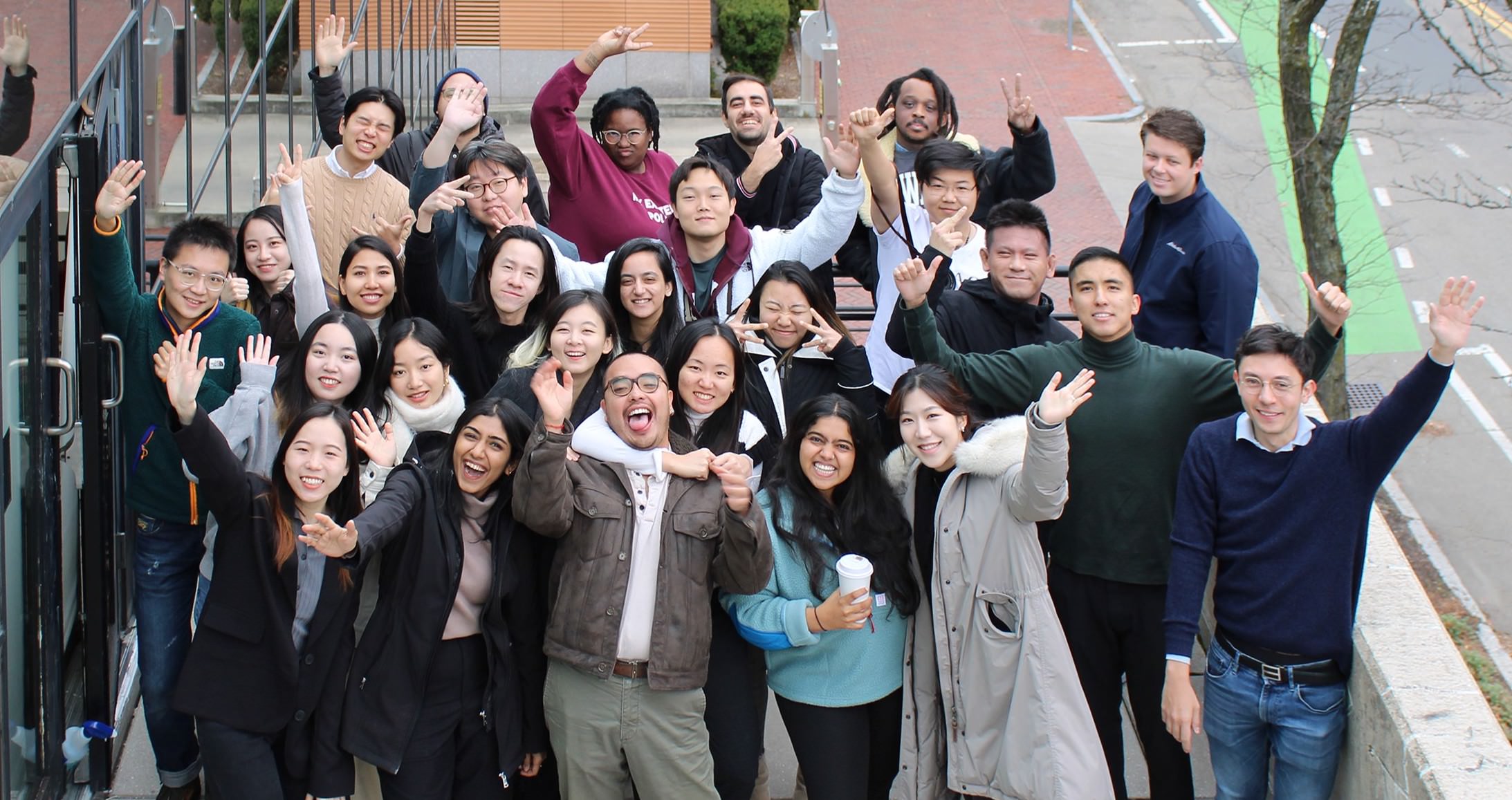
Palak and the cohort of Masters of Architecture in Urban Design ’24..
Mittal Institute: Much of your thinking centers on sustainability, climate change and resilience. Can you speak about your scholarship as it relates to these themes?
Palak Gupta: My research is focused in the themes of sustainability, climate change, and resilience, which I consider to be some of the most urgent and interrelated challenges of our time. These themes are at the core of my academic and professional pursuits, and they inform my research and design in several ways. I am committed to exploring how architecture and urban design can be harnessed to mitigate the impacts of climate change while promoting sustainability. I’m particularly interested in innovative design strategies that incorporate renewable energy systems, green infrastructure, and sustainable materials to create environmentally responsible and resilient built environments.
I believe that truly sustainable solutions must not only be environmentally friendly but also socially equitable. This includes examining how communities vulnerable to the impacts of climate change and urbanization can be empowered through thoughtful design and policy interventions, ensuring that the benefits of sustainable practices are accessible to all.
My research involves engaging with case studies, particularly in South Asia, where rapid urbanization and climate vulnerabilities intersect. By studying real-world examples, I aim to identify best practices and innovative solutions that can be applied in a broader global context, drawing from the experience gained during my fellowship at the World Resources Institute, India.
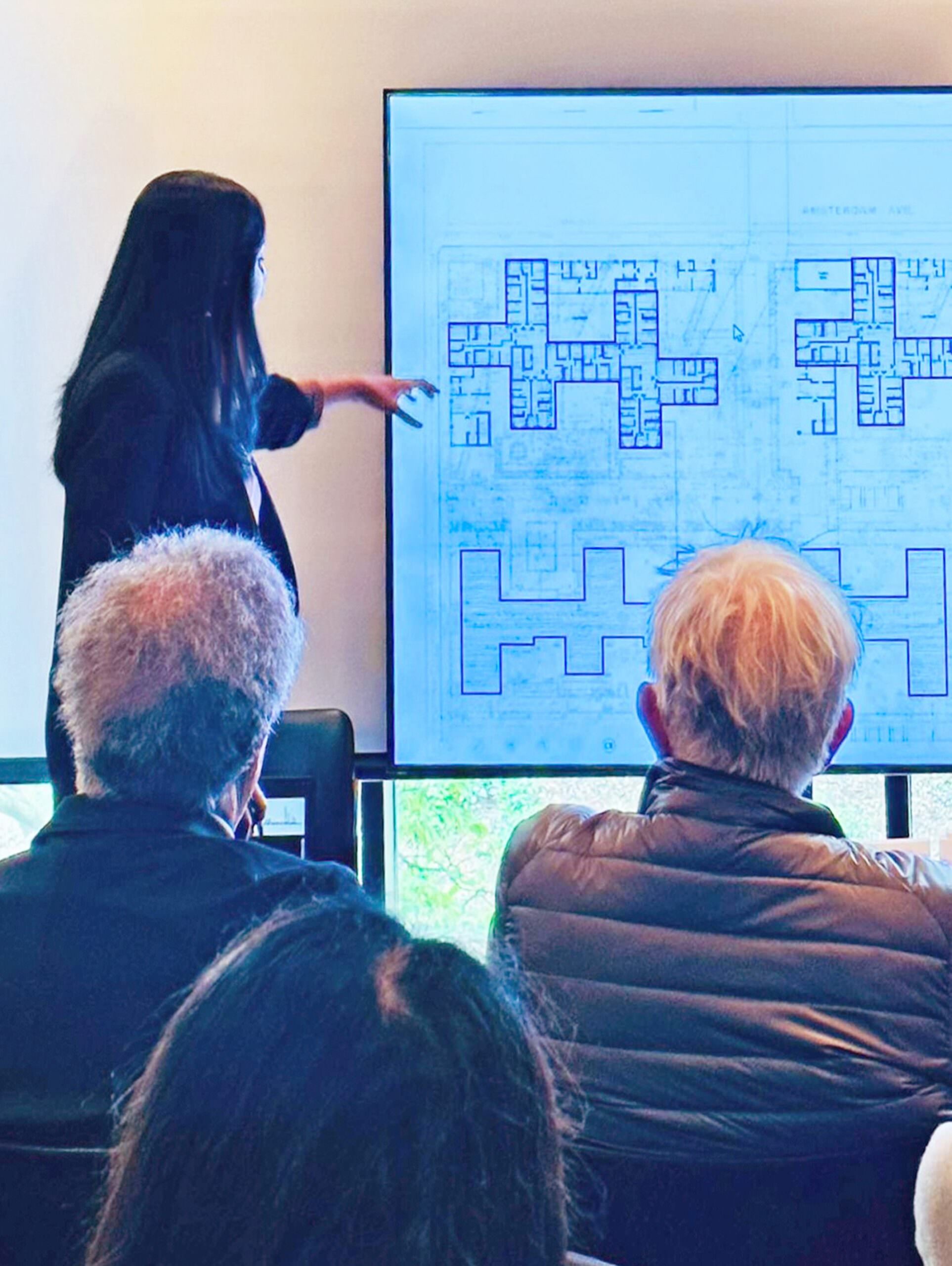
Palak presents an affordable housing project at the GSD in May 2023..
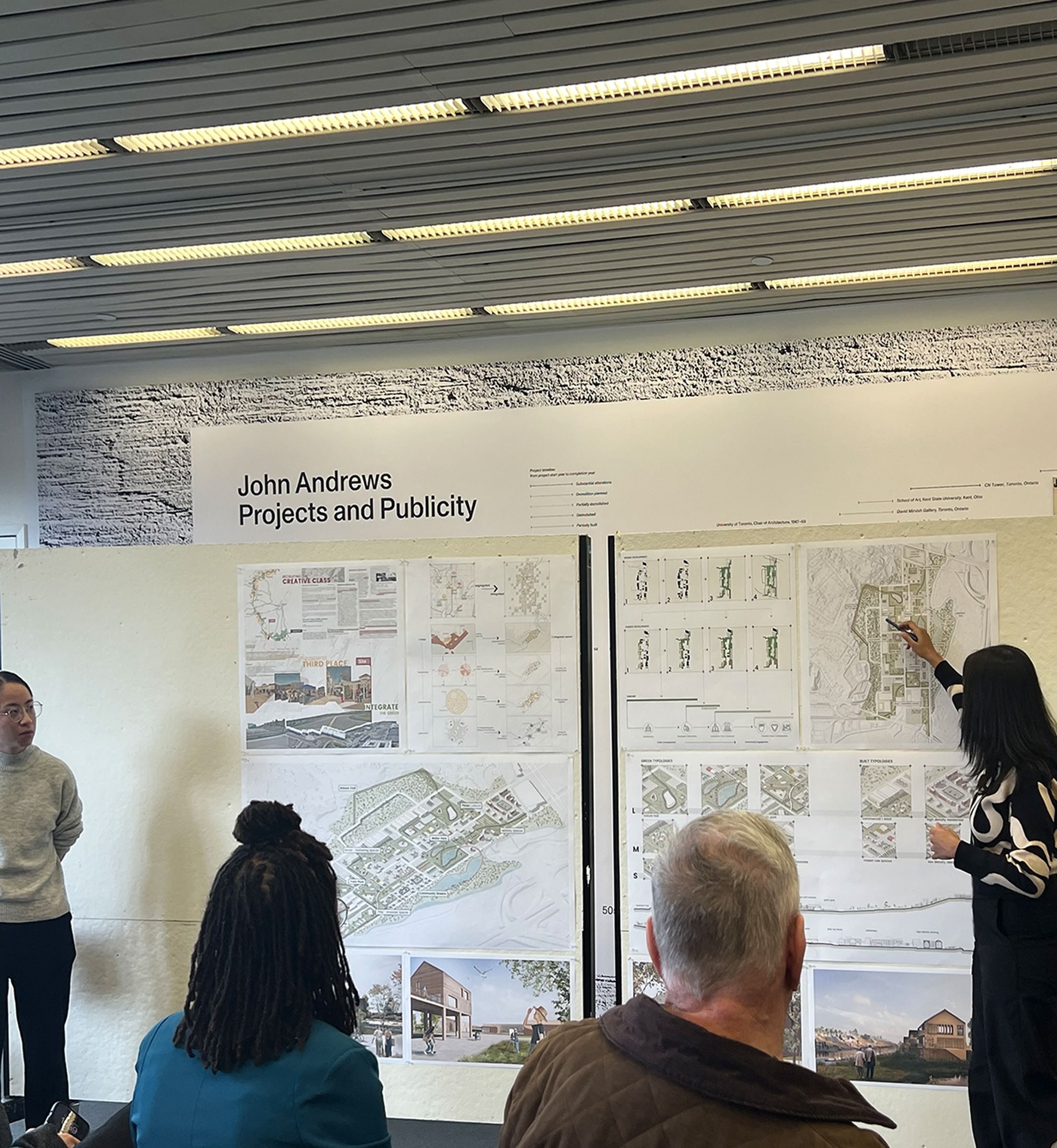
Palak presents her first semester project with her partner, Yiting Zhang, at Harvard GSD in December 2022.
Mittal Institute: As we grapple with the effects of climate change, minority communities are often disproportionately affected. How does your work intersect with these communities?
Palak Gupta: Climate change exacerbates existing social and environmental inequalities, and I am committed to working towards solutions that empower and support the communities in the face of these challenges. I believe it is crucial to understand the unique challenges the communities face, whether it’s related to increased environmental risks, limited access to resources, or inadequate infrastructure. By conducting in-depth research and engaging with the communities directly, I aim to contribute to a more comprehensive understanding of their needs and strengths.
In my professional practice and projects, I prioritize inclusive and participatory design approaches. This means collaborating closely with the communities to co-create solutions that not only address their environmental challenges but also respect their cultural and social identities. The solutions that are both contextually relevant and sustainable in the long term are always the key.
My work is driven by a commitment to social and environmental justice, particularly in the context of climate change. I actively engage with minority communities through research, practice, and education, with the overarching goal of contributing to equitable and sustainable solutions that enhance the resilience and well-being of the communities in the face of emergent environmental challenges.
My work is driven by a commitment to social and environmental justice, particularly in the context of climate change. I actively engage with minority communities through research, practice, and education, with the overarching goal of contributing to equitable and sustainable solutions that enhance the resilience and well-being of the communities in the face of emergent environmental challenges.
Mittal Institute: What are you most proud of thus far in your architectural or academic career?
Palak Gupta: One of the most significant accomplishments in my architectural and academic career is my research and community engagement work in the intersection of urban design, climate change, and social equity.
I’m truly grateful for the opportunity I had during my time at the World Resources Institute India. The fellowship was a pivotal moment in my academic and career journey. It was the experience that inspired me to pursue further studies in urban design. The insights gained during this time solidified my commitment to addressing complex urban challenges and engaging with vulnerable communities to foster positive change. My engagements with community organizations and stakeholders allowed me to investigate local communities through a distinctive lens, one that emphasizes acknowledging the ordinary and enabling an inclusive, bottom-up approach to working with the community and its culture. This approach has shaped my commitment to inclusive design practices that prioritize local knowledge, experiences, and cultural contexts.
What I am most proud of in my career is my dedication to addressing real-world urban challenges through research and education. It is my belief that the built environment has a profound impact on society, and I am committed to leveraging my skills and knowledge to make a positive difference in the world of architecture and urban design.
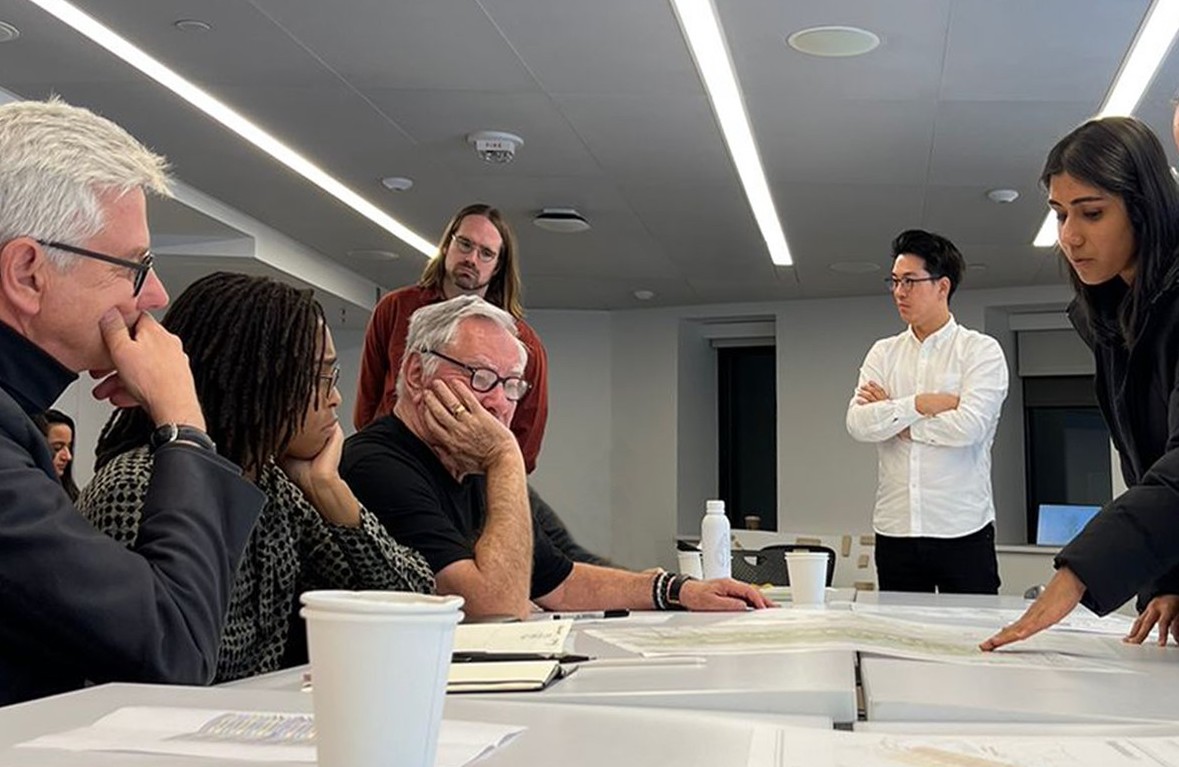
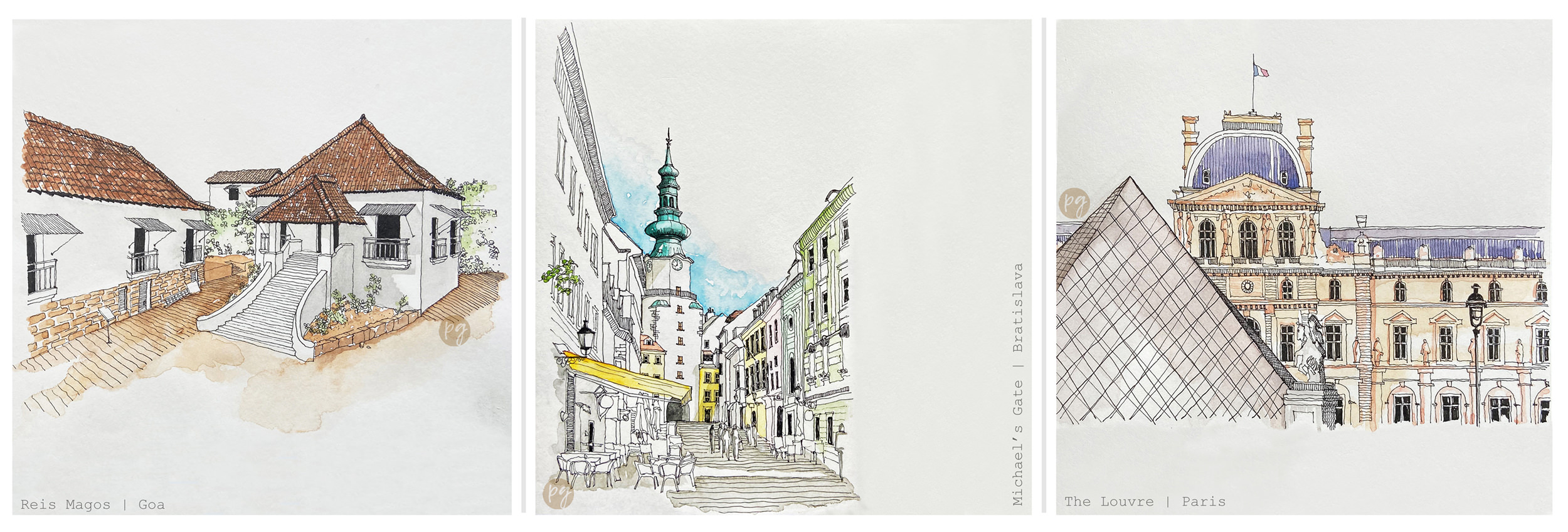
Image above: Palak, far right, at a desk review in November 2022. Image below: Travel sketches by Palak...
Mittal Institute: Where do you see yourself post-Harvard?
Palak Gupta: After completing my studies at Harvard, I envision myself taking on a role that allows me to apply the knowledge and insights I’ve gained here. Hence, I would like to contribute to projects that prioritize environmental and social responsibility, striving to create built environments that are not only aesthetically pleasing but also environmentally and socially sustainable. I am passionate about working directly with communities, so I aspire to seek opportunities to engage with urban planning and design agencies that focus on community development and climate resilience.
